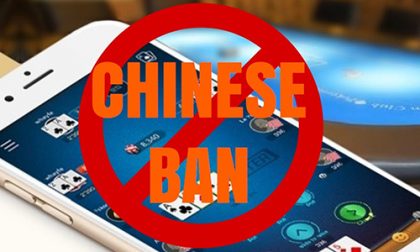China’s No-Poker Syndrome Continues
China’s chances to be the next big market for mainstream poker have taken another hit, as the country’s newly formed State Administration of Press and Publication (SAPP) has decreed that poker-themed video games will no longer be considered for official state licensing.
SAPP was formed in April of 2018, which led to a freeze and backlog in China’s licensing system that is only now beginning to ease. Along with that easing, however, SAPP declared earlier this month that poker-themed video-game applications from new licensees; existing licensees aren’t theoretically affected by the ban, but an informal ban against them also appears to be in place, since only one poker-themed game has been approved, and that came just after SAPP restarted the licensing process.
 Poker isn’t the only game category to receive the virtual ban hammer, as mahjong games also received the thumbs-down. As with poker video games and apps, Chinese gamblers have also found ways to utilize mahjong games and apps as a vehicle for underground gambling for real stakes. China’s authorities continue a weeding-out process that also involves the continued policing of social networks, an important element in last year’s crackdown aimed at China’s underground poker economy that has crippled the game’s growth in the world’s most populous nation.
Poker isn’t the only game category to receive the virtual ban hammer, as mahjong games also received the thumbs-down. As with poker video games and apps, Chinese gamblers have also found ways to utilize mahjong games and apps as a vehicle for underground gambling for real stakes. China’s authorities continue a weeding-out process that also involves the continued policing of social networks, an important element in last year’s crackdown aimed at China’s underground poker economy that has crippled the game’s growth in the world’s most populous nation.
Poker and mahjong may represent the focus of SAPP’s and China’s anti-gambling efforts, but it’s also just a larger part of an attempt to make the entirety of games available to Chinese customers adhere to government-decreed standards. Another segment of games receiving the banhammer are games that are themed upon China’s imperial, pre-Communist past. These games, per a TechCrunch update, include “gongdou,” which translates as “harem scheming”, as well as “guandou,” the word for palace-themed official competition. Such games may involve “political metaphors” that China’s authorities believe run counter to its own beliefs and policies.
SAPP conducted a press conference on April 10 in which all these restrictions were announced. Translated reports of that announcement indicate that SAPP has also created a sub-division, the Online Game Ethics Committee, which will vet submitted games to ensure that they adhere to China’s social values, meaning stricter censorship than before. SAPP and its ethics committee will also require anti-addiction protocols in mobile games (mobile being a big, big thing in the Chinese market), and evaluate in a deeper manner online games that can be played without a downloaded client.
The changes have made for a major shift in the regulatory process since SAPP came into being and issued its first approvals in December of 2018. “The rate of approvals is slower than it has been in prior years,” according to a Niko Partners report cited by the South China Morning Post. “This is primarily due to a crackdown on titles in the poker and mahjong genre after China’s government became concerned about real world money being used in these games.”
The report also noted that poker and mahjong titles used to account for 37% of the gaming licenses issued, which speaks to how vibrant the country’s underground scene has been. Now, just one — or zero, depending on which report is cited — new poker or mahjong titles has been greenlighted.


















COMMENTS